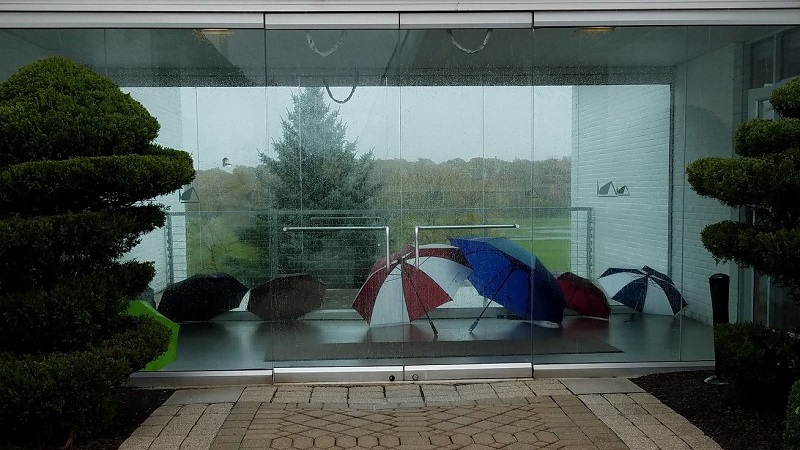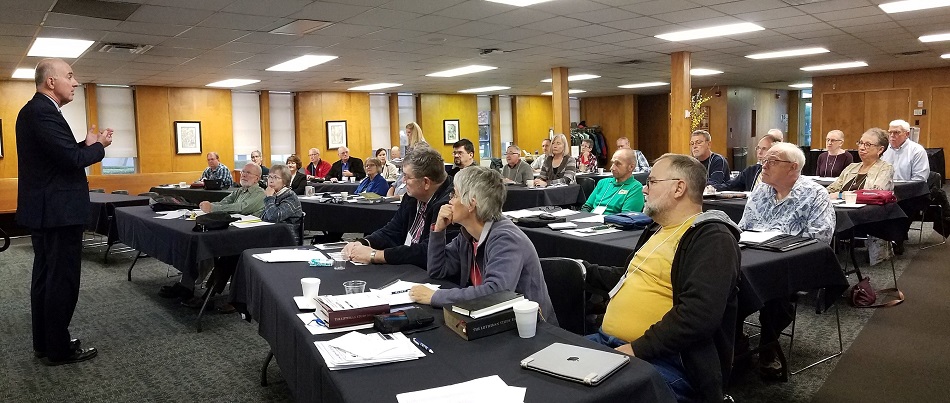
Wind and rain have made this second day of Luther Hostel a cold and dreary one; the first picture posted here is what the entryway to Luther Hall looked like late morning, right before Dr. Fickenscher began his talk on “Sharing the Gospel in Time of Suffering.” The second is of our Luther Hostel attendees during the lecture.
The theme of suffering as viewed through the theology of the cross has shaped every discussion for this year’s conference. In this particular session, Dr. Fickenscher began by speaking of the difficulty of Deus absconditus; in English, the “hidden God.” God’s Word doesn’t say everything. It says everything God wants it to say, but there are things He has hidden from us, for our own good. “But we also don’t say just trust God, shut up,” he added. “We look past the hidden God to see what God has revealed.”
And what has God revealed? In the New Testament, when Jesus confronts suffering the usual result is immediate, miraculous healing. In the Old Testament, we are more often than not told why suffering has come–often as a punishment, sometimes for some other reason (as in Job’s case). But how does that speak to us now? In this present age we receive neither immediate deliverance from our particular sufferings nor an explanation for them. We cannot read God’s mind and to do so – to presume to tell those (even ourselves) in suffering that God is punishing us for this or that sin, or to promise what God doesn’t promise (as in the prosperity gospel, which claims that the right kind and amount of obedience to God will earn a Christian both financial and physical health) – offers neither truth nor comfort.
Yet we also shouldn’t settle for promising less than God promises. That the cross of Christ accomplished the forgiveness of sins and life eternal for those who believe in Him is most certainly true. The sure and certain hope that his wife is in heaven gives the widower comfort–and yet the suffering of the survivors remains. He knows that she’s all right, but how will he take care of his children without her? “You’re still preaching to people who are not dead,” Dr. Fickenscher pointed out. “Does God promise anything else to us? What can we say in addition?”
“Comfort in all trials,” one attendee finally answered. “Peace.”
“Ah,” Dr. Fickenscher said, grinning. “And what does ‘comfort in all trials’ mean? And ‘peace’?”
He soon answered his own question with the Gospel. “Every good and perfect gift comes from God. The sin that cuts us off from God – from all good things – has been nailed to the cross. We are reconciled to Him, once more joined with Him who gives every good and perfect gift. God is all loving, all powerful, all knowing. He wants to give us the best. He knows what is good, and not just what we think is good. He knows that for me today is not my day to be in heaven. He knows why taking my children now is best for me. Or why taking care of my children on my own is best. God is giving me right now everything that is truly good for me.
“It’s best to understand this now when it’s not the worst time,” Dr. Fickenscher continued. “Hear it now, so that when tragedy strikes, you know God is taking care of you in the best way. You swallow hard and you know that He is with you. And the next day you wake up, swallow hard, and know that He is with you. Because of the cross we are reconciled. God is with us right now. Giving us whatever is really best for us right now.” In the theology of the cross, we have true comfort and peace in suffering.

